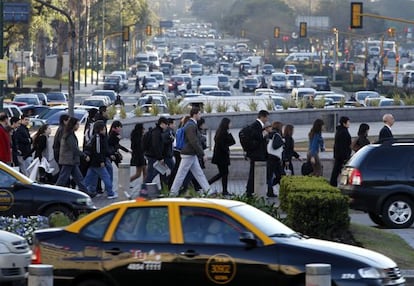Marathon Buenos Aires subway strike ends but political strains linger
Dispute over control of local services reignites rivalry between president and mayor


A 10-day strike by subway workers that had pitted President Cristina Fernández de Kirchner against her bitter political rival, conservative Buenos Aires Mayor Mauricio Macri, was called off on Tuesday after the train operator reached an agreement with the unions, which will include a rise in fares.
The strike, which was the longest in the history of the capital's subway system, caused large traffic jams during rush hour in Buenos Aires, affecting more than one million passengers.
The agreement was reached after a long behind-closed-doors meeting between the metro workers' union AGTSyP, government officials, and the subway operator. Salaries for metro workers will be hiked by 23 percent. The union had been demanding pay rises of 28 percent.
The dispute had been compounded by the long-running political confrontation between Fernández de Kirchner and Macri over whether certain public services should be under the control of the central government or the city of Buenos Aires.
Macri, who plans to run for president in 2015, has been demanding the transfer of control of the city's police force and transportation systems. Last January, an agreement was signed so that the city could take charge of the subway system, but in March Macri returned the concession to the central government arguing that he also needed the transfer of resources for infrastructure improvements to avoid accidents, such as the deadly one that occurred in February when a train slammed into a station, killing 51 people.
The Fernández de Kirchner administration refused to take the service back and a judicial dispute unfolded to determine who should assume control. The strike dragged on as the mayor refused to assume responsibility for negotiating salary hikes with the metro unions because he believed he was no longer in charge. But a federal judge ordered the city, not the central government, to the bargaining table.
"I should have announced that I won't be a candidate in 2015 and everything would have been fine," Macri said ironically. Nevertheless, the millionaire businessman said that he won't give up his aspirations to run for president.
"The problem is: the incompetence of the Buenos Aires government," Interior and Transportation Minister Florencio Randazzo shot back.
De la Rúa trial
Former President Fernando de la Rúa went on trial on Tuesday on corruption charges stemming from allegations that bribes were paid to senators and other politicians in 2000 in exchange to get a labor reform passed in Congress.
De la Rúa, who served from 1999-2001, faces up to 16 years in prison if he is convicted on counts of bribery and embezzlement of public funds.
The labor relaxation law was one of the requisites that the International Monetary Fund was demanding of Argentina, when it was facing one of its most critical economic periods. When the bribery scandal erupted in October 2000, then-Vice President Carlos "Chacho" Álvarez resigned in protest, breaking the political coalition that was governing at the time.
Mario Pontaquarto, then secretary of the Senate, confessed that he was present at a meeting where De la Rúa "offered things" to a group of senators. Pontaquarto, who is now a waiter, is also on trial.
Tu suscripción se está usando en otro dispositivo
¿Quieres añadir otro usuario a tu suscripción?
Si continúas leyendo en este dispositivo, no se podrá leer en el otro.
FlechaTu suscripción se está usando en otro dispositivo y solo puedes acceder a EL PAÍS desde un dispositivo a la vez.
Si quieres compartir tu cuenta, cambia tu suscripción a la modalidad Premium, así podrás añadir otro usuario. Cada uno accederá con su propia cuenta de email, lo que os permitirá personalizar vuestra experiencia en EL PAÍS.
¿Tienes una suscripción de empresa? Accede aquí para contratar más cuentas.
En el caso de no saber quién está usando tu cuenta, te recomendamos cambiar tu contraseña aquí.
Si decides continuar compartiendo tu cuenta, este mensaje se mostrará en tu dispositivo y en el de la otra persona que está usando tu cuenta de forma indefinida, afectando a tu experiencia de lectura. Puedes consultar aquí los términos y condiciones de la suscripción digital.








































